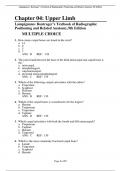Exam (elaborations)
Chapter 04: Upper Limb Lampignano: Bontrager’s Textbook of Radiographic Positioning and Related Anatomy, 9th Edition
- Course
- Institution
Chapter 04: Upper Limb Lampignano: Bontrager’s Textbook of Radiographic Positioning and Related Anatomy, 9th Edition MULTIPLE CHOICE 1. How many carpal bones are found in the wrist? a. 14 b. 8 c. 5 d. 7 ANS: B REF: 128 2. The joint found between the base of the third metacarpal and...
[Show more]



